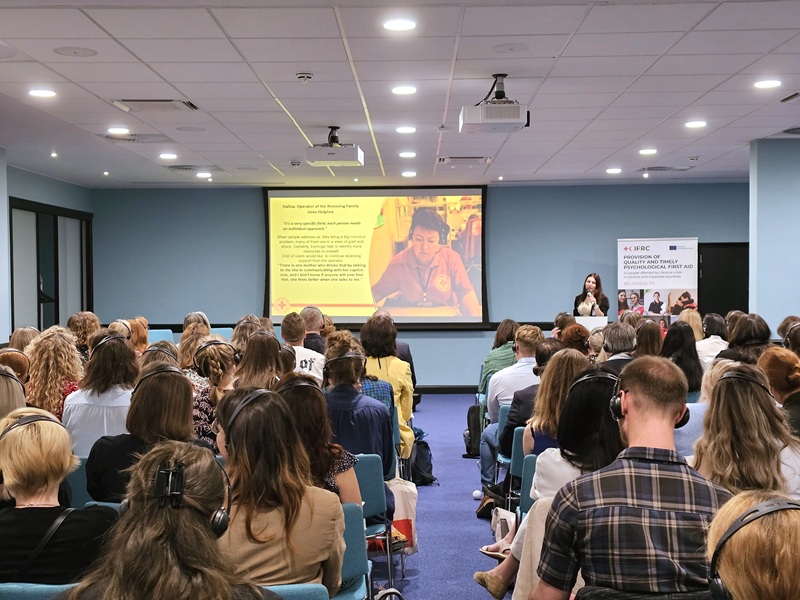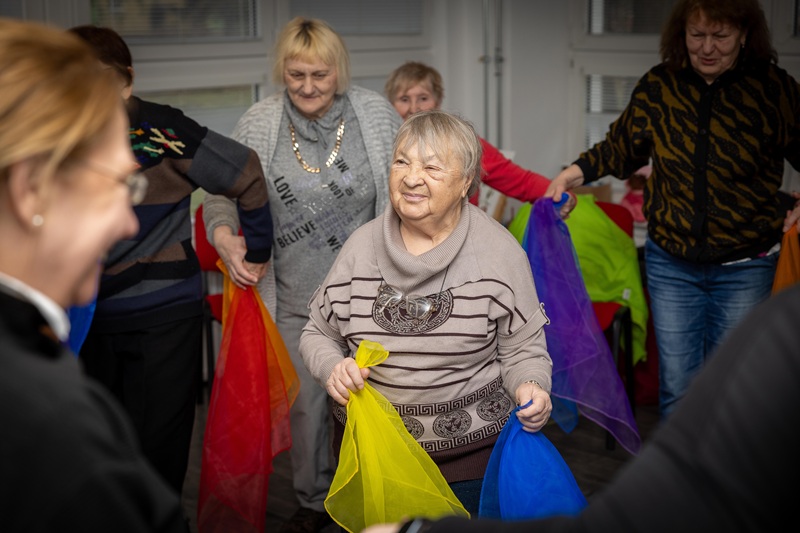From crisis to care: why mental health and psychosocial support saves lives in emergencies
Mental health and psychosocial support (MHPSS) is lifesaving in times of crisis. Providing this support early during emergencies can prevent long-term mental health problems and help people recover faster.
This message resonated across the discussions at the event “Promoting well-being, rebuilding hope: lessons from mental health and psychosocial initiatives for communities affected by the conflict in Ukraine”, held on 18 June by the European Commission, the International Federation of Red Cross and Red Crescent Societies (IFRC) and the Red Cross EU Office.
Reflecting on key learnings from a large-scale 3-year partnership between the Commission and the Red Cross under the EU4Health programme, speakers stressed the importance of including mental health and psychosocial support (MHPSS) considerations in times of crises.

When people are forced to flee their homes, they face enormous stress and uncertainty. Early mental health support helps them cope, rebuild their lives, and avoid more serious mental health issues later on. It also reduces the need for expensive, long-term treatment.
“With this initiative, we have shown that MHPSS can be part of national emergency plans. Preparedness can be strengthened by building capacity of organisations, strengthening partnerships and listening to the voices of people. The voices of those affected are at the heart of every solution,” said Birgitte Bischoff Ebbesen, IFRC Regional Director for Europe.
Over the past three years, Red Cross societies in 28 European countries have supported more than 600,000 people affected by the humanitarian crisis in Ukraine in addressing their mental health needs. They have offered help through hotlines, one-on-one and group counselling, psycho-educational workshops and mobile clinics
Isabel de la Mata, Principal Advisor on Health and Crisis management at the European Commission, stressed the importance of “taking care of the carers” in this context. Across Europe, Red Cross volunteers and staff, as well as teachers, social workers and cultural mediators have been working with affected people to support their recovery and psychological wellbeing. Volunteers and staff are often at the forefront of crisis response, exposed to devastating situations and stories of loss and working in stressful or challenging conditions, all of which can take a significant toll on their mental health and psychosocial wellbeing. Through the project, MHPSS has reached 18,000 responders.
This initiative has helped European communities become more resilient. While it started as a response to the international armed conflict in Ukraine, it has shown how important is to include mental health in all emergency preparedness planning. When mental health is integrated from the outset, communities are better equipped to cope with shocks, recover quicklier, and stay connected during times of crisis.
Dedicated resources must be allocated to building MHPSS capacities and integrating it in emergency preparedness, response, and recovery budgets. Policy-makers should also promote cross-sector collaboration to mainstream MHPSS across health, education, social services and other relevant sectors, reinforcing its critical role in comprehensive crisis management. By aligning efforts, pooling resources and avoiding duplication and gaps, intersectoral coordination enhances the effectiveness and reach of MHPSS interventions, strengthening the overall quality, sustainability and accountability of crisis and emergency response.
Through the project, almost 17,000 people across Europe have been trained to deliver MHPSS – providing an important resource to draw on in the case of future emergencies, disasters or armed conflicts.
Building on this momentum, the EU can play a key role in driving health policies across Member States and engaging them to mainstream mental health into different policy sectors: education, employment, social affairs, migration and others. To maximise impact, mental health and psychosocial support should be proactively integrated into emergency preparedness through holistic and inclusive approaches.

Four aspects that have been key in the successful implementation of the project were further discussed by participants in breakout sessions:
1. MHPSS tailored for specific groups: services have to be adapted to meet the diverse needs of people— taking into account differences in age, gender, abilities, and socio-economic situation. This helps ensure that support is relevant, and accessible to everyone.
2. Care of first-line responders: The well-being of those providing care must be a priority from the start. It should be included in policies, embedded in all layers of an organisation and supported by budgets. The testimony of Natascha, Head of Migration and EU4Health Project Management, Regional Branch German Red Cross, resonated strongly with this session: “Professionals working with refugees face unique challenges and often overlook their own needs. Balancing commitment and self-care is crucial to prevent burnout, making stress management vital for both full-time and volunteer staff.”
3. Communities as agents of change: long-lasting and sustainable impact begins with community engagement. Many displaced people from Ukraine became volunteers and staff themselves, offering support to others. When communities are involved, they help shape the services.
4. Cooperation and mainstreaming of MHPSS across sectors: Mental health influences every part of life, so the response must be just as wide-reaching. Strong collaboration with local partners has been essential to building lasting networks of care that are more effective, inclusive, and far-reaching.
In her closing remarks, Mette Petersen, Director of the Red Cross EU Office, emphasised the need to take a broad approach to mental health — one that takes into consideration all the factors that can positively or negatively impact people’s well-being, including emotional, social and environmental aspects.
As needs persist, budgets tighten, and political priorities shift in a complex geopolitical environment, local actors such as the Red Cross remain committed to offering support and standing alongside communities. This conference served as a recognition of the power of united and harmonised action across Europe, driven by the initiative of the European Commission. We hope this example can inspire further action and contribute to shaping long-term strategies for mental well-being.
Red Cross Mental Health Response to the International Armed Conflict in Ukraine (2022-2025)
Compilation of Successful MHPSS Services implemented by National Red Cross Societies
For media inquiries, please contact Eva Oyón on: eva.oyon@redcross.eu or +32 2 235 09 22

